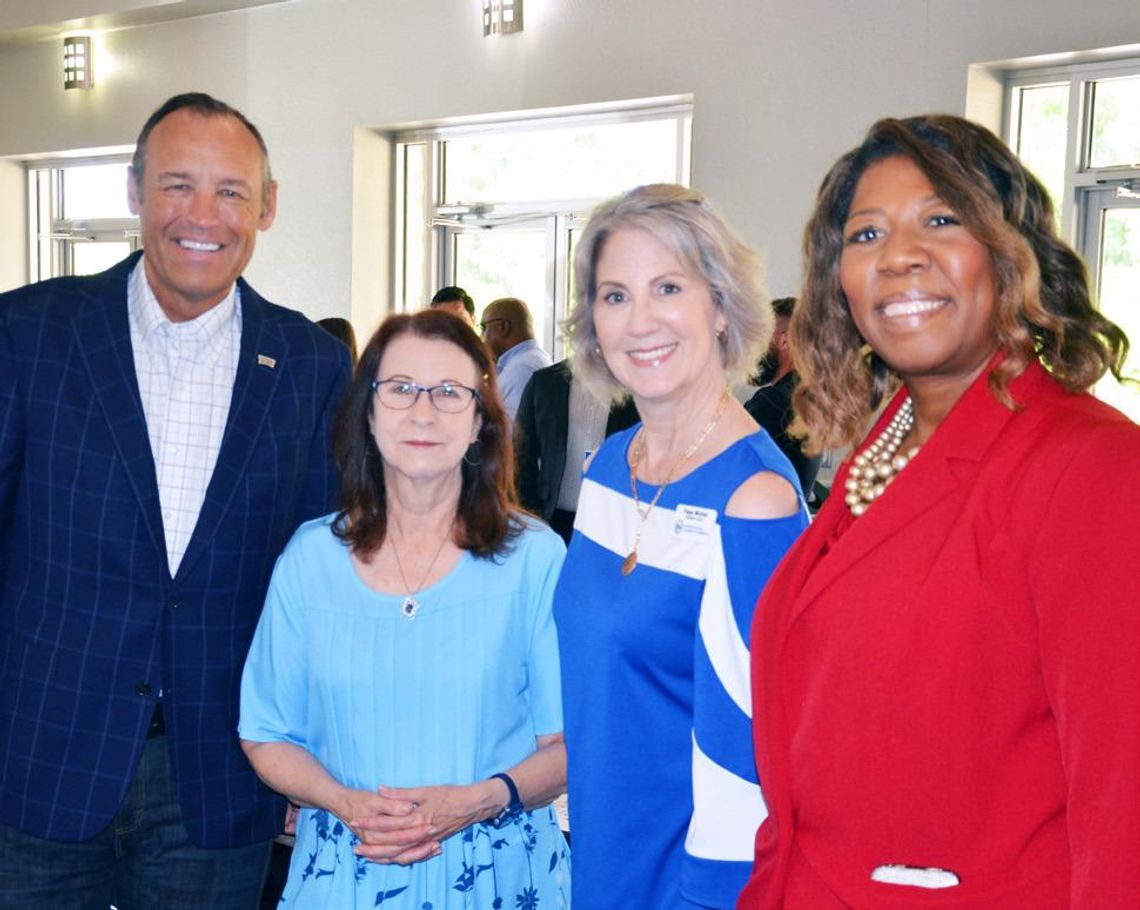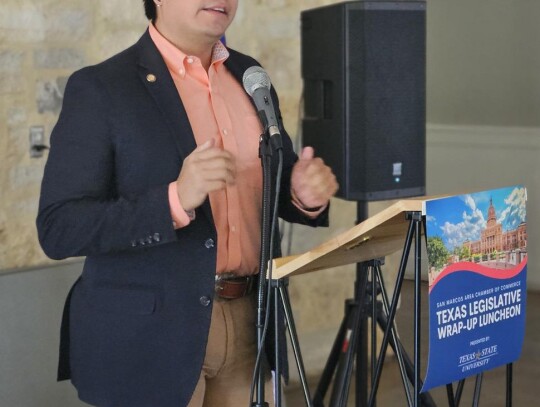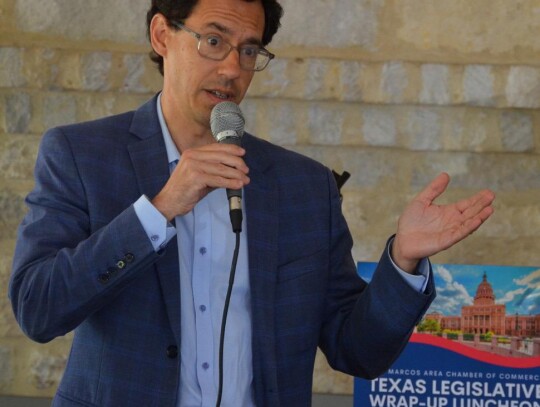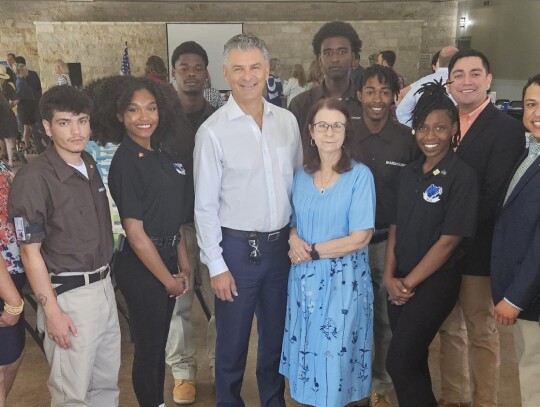The San Marcos Chamber of Commerce recently sponsored an opportunity to gain insight into how the bills passed by the 2023 Texas Legislature in its biennial session will affect Central Texas.
The event, held at the city of San Marcos’ Pauline Espinosa Community Hall, Wednesday, brought together a large group of local business leaders, government officials and a key contingent from Texas State University.
San Marcos Chamber President Page Michel thanked those attending, acknowledging one of the key sponsors, Texas State University, for its continuing support of the chamber.
The ongoing needs of the Texas legislature in 2023, and a presidential request kept two anticipated keynote speakers from attending in person. Instead, Jorge Ramirez, chief of staff for Texas State Sen. Judith Zaffirini (D-Laredo, District 21) and Miguel Arredondo, chief of staff for Texas Rep. Erin Zwiener (D-Driftwood, District 45), each introduced videos in which the respective legislators recapped the 88th Texas Legislative year that began in January and briefly ended on May 29, before Gov. Greg Abbott called everyone back for a special session largely devoted to the property tax reform stalemate.
Zwiener explained that her absence was necessitated by a trip to Washington, D.C. at the behest of President Joe Biden’s administration. She cited the fine bipartisan work of the legislature in passing property tax reforms and said much needs to be done with respect to education.
Zaffirini, who has one of the most stalwart records in terms of attendance and consecutive votes in the legislature, said the recent special session and potential for more yet to come, has altered many of her summer plans.
Both legislators highlighted what they said were the pluses and minuses of the legislative year so far, including the most recent special session in which a bipartisan effort successfully passed property tax reforms. Each said it is highly likely that Abbott will bring all back for a second special session in October to address unfinished business for the state schools and its teachers.
Zaffirini said that the passage of HB5, the named the Texas Jobs, Energy, Technology, and Innovation Act, a bill related
to agreements that authorize a limitation on the taxable value of certain property, the goal of which is to provide for the creation of jobs as well as to generate state and local tax revenue, was a “powerful” moment for the state’s future financial health. The bill was sent to the governor for his signature on May 30 and he signed in on June 7.
“This new law promises to spur economic growth where it is needed most,” Zaffirini said.
The legislature is also on call to deal with the scheduled Fall trial before the Texas Senate of State Attorney General Ken Paxton, suspended from his office since May 27, following his impeachment on 20 articles by the Texas House of Representatives.
Texas Association of Business CEO Glenn Hamer discussed the importance of the contribution by businesses in the state and the efforts made by organizations such as the San Marcos Chamber of Commerce. He noted that Texas came into its session year with a record $32.7 billion surplus as opposed to California that had a deficit in its state coffers, and that unity of purpose among both parties helped legislation be passed that his association supported.
Hamer said, “We were able to get over 260 economic organizations and chambers,” to be a part of the cohesive effort to see legislation passed in 2023 that benefits business.
Michel said that the local chamber is keenly interested in what may happen in October regarding education in the state.
“The Chamber signed on to the support letters for the Economic Development Incentive tool, the replacement tool. We're very glad that that got passed all ready,” Michel said. “I'll be watching education
funding, which is high on our list of priorities.” She emphasized that schools here are educating the next workforce, and that these young people represent the talent pipeline for the city and Hays County.
Also attending was Hays County Commissioner Court Judge Ruben Becerra, who took note of the bipartisan achievements Hamer and the legislators described. “I love the message that Glenn shared with us, specifically about unity. I think we must do everything we can to reach for all the things that are consensus-building, because there is so much we can do to benefit our residents,” Becerra said.
The city of San Marcos was represented by Mayor Jane Hughson, and council members Matthew Mendoza, Mark Gleason, Jude Prather and Alyssa Garza. The mayor and council recently returned from an information trip to the nation’s capital to make more concrete key relationships with federal officials. Just as Zwiener is participating in Washington this week, Gleason said the purpose of the city council traveling to Washington was valuable in that much of their conversations in Washington directly impact potentially important outcomes for the city, that dovetail with what happened in Austin this spring.
Gleason said, “I think it's a good use of our time. It's informative,” and the ability to go as a group was also highly productive. He said there are large amounts of federal funding available to municipalities, and by showing a unified force, the city has established a stronger and hopefully more fruitful foothold with federal opportunities.
For Texas State University President Kelly Damphousse, the information provided about legislative efforts to provide additional funding for the state’s colleges and universities was encouraging. Texas State is working to move from a Research 2 classification into a Research 1 category. Damphousse said that the university is moving forward in its efforts to increase the number of Ph.D. programs that the San Marcos campus will offer in the future. Funds that the state is authorizing this year for universities and colleges will likely benefit that initiative, the recap noted.
Students from the Gary Job Corps Center’s material handling course assisted in the set-up for the luncheon and students from the Student Government Association greeted attendees, having the opportunity to hear how legislation may make life better for each of them in years to come, especially if they have entrepreneurial dreams.
Gary Job Corps Material Handling student Johntrell Butler said he and his fellow students enjoyed helping out. Butler said that when he completes his education, he hopes to start his own business.
“Hopefully, a truck driving business,” he said.











